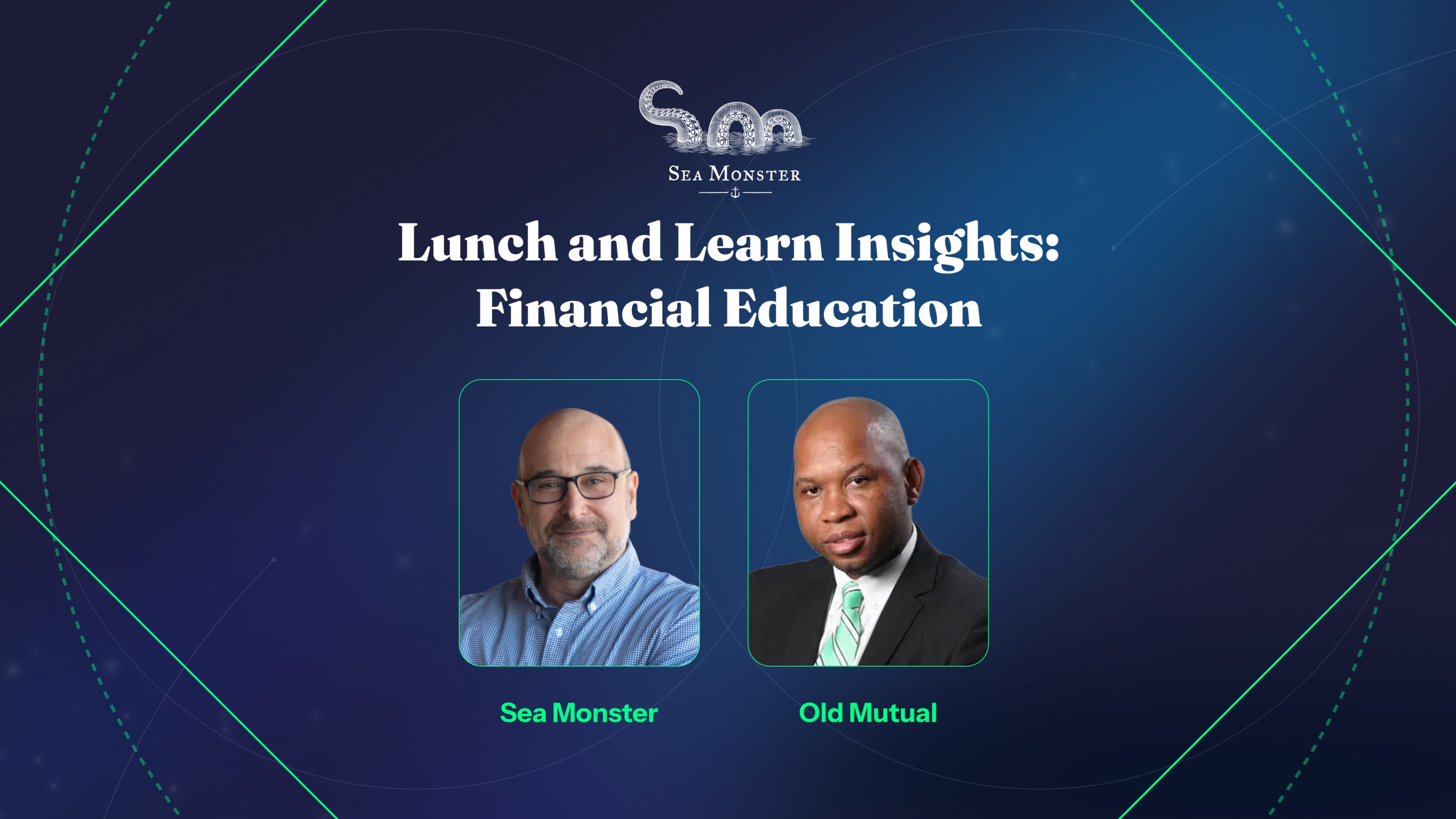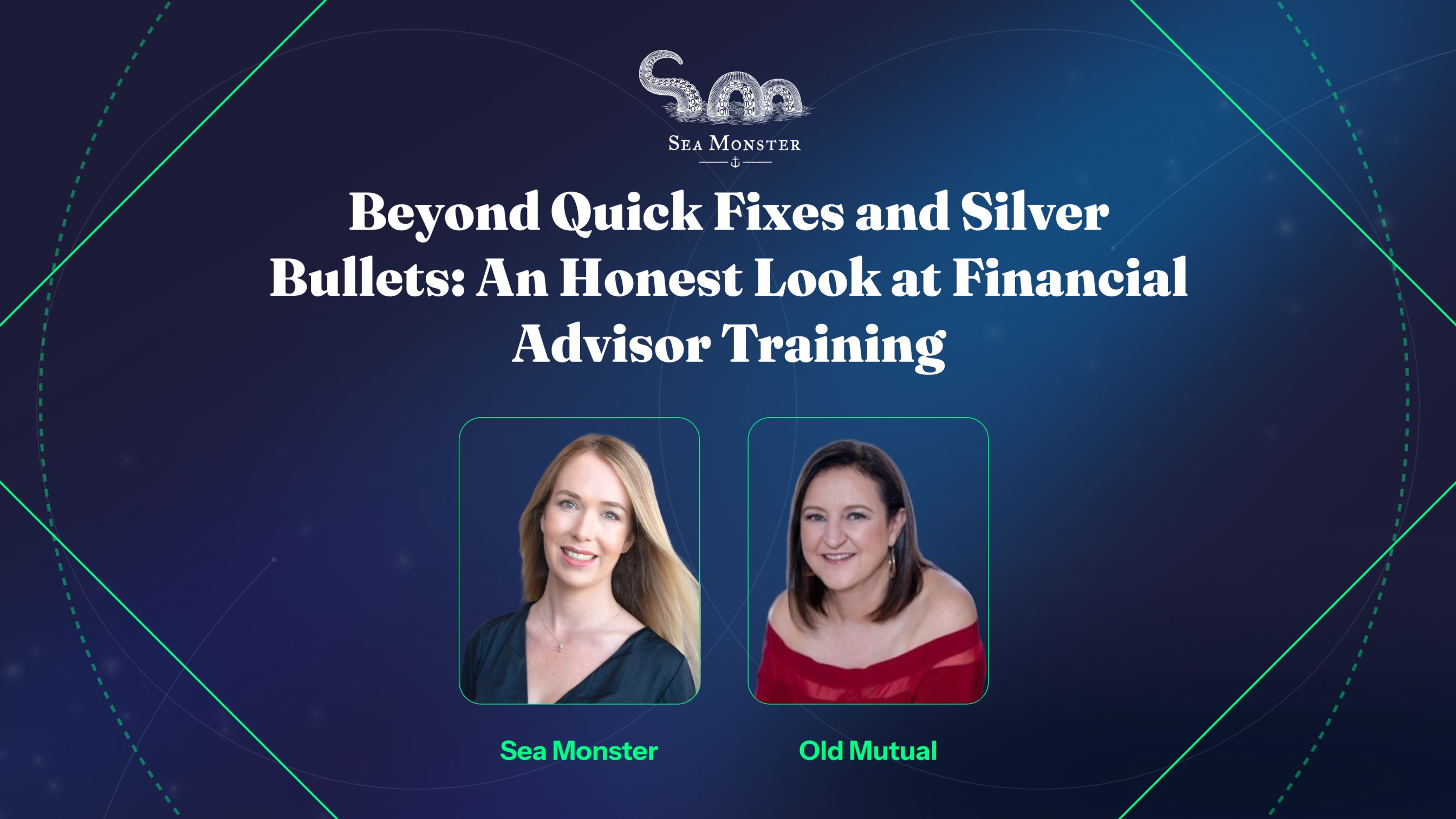South Africa has quietly become a global leader in digital financial education, pioneering powerful, technology-enabled solutions. This August, Sea Monster hosted a lunch and learn session with John Manyike, Head of Consumer Financial Education at Old Mutual, revealing surprising insights about why traditional approaches are failing, how patient capital thinking is reshaping the industry, and what South African innovations are currently working in this space.
Behind the statistics
Let's start with the uncomfortable truth: knowing about money and actually making smart money decisions are completely different skills.
"Financial knowledge without action is essentially worthless," explains Manyike. Just like knowing what constitutes healthy eating doesn't automatically translate to good nutritional choices, understanding financial concepts doesn't guarantee smart money decisions.
The real challenge isn't information transfer, it's behaviour change. And that's where traditional education approaches have been failing dramatically.
Consider this: you can sell someone an insurance product today, pass all regulatory affordability tests, and check every compliance box. But if that customer doesn't truly understand the value proposition, your lapse rates in two or three years will be astronomical. You haven't solved the problem; you've just kicked it down the road.
A sophistication paradox
This problem is particularly acute in South Africa, which presents a fascinating contradiction in that we have some of the world's most sophisticated financial institutions operating alongside extremely low financial capability among consumers.
"We've got some of the most sophisticated banks and insurance companies in the world," Manyike observes. "Discovery Vitality, Old Mutual's Moneyversity programme, eBucks, these things are best in class globally."
But this institutional sophistication creates its own problems. Complex financial products require equally sophisticated understanding from consumers. The gap between what companies can offer and what customers truly comprehend has created unsustainable business models built on confusion rather than genuine value understanding.
Digital solutions and South Africa's global leadership
Yet despite these challenges, South African businesses have found innovative ways to bridge this gap. To service the financial education needs of South Africans, local businesses have successfully developed and implemented some world-class solutions. In many ways, South Africa has emerged as a leader in digital financial education globally, extending particularly to gaming platforms and interactive experiences.
"When I attended the OECD international conference on consumer financial education in Amsterdam, I was quite stunned," recalls Manyike. "When I looked at what other countries in Europe were showcasing, then looked at what we're doing, I said 'what?' We are there. In some instances, we may be even ahead of other developed countries."
One of the most significant developments in digital financial education has been the adoption of familiar platforms over sophisticated new apps. WhatsApp, in particular, has become a game-changer for reaching audiences who need financial education most.
"WhatsApp has been a game changer for many businesses," explains Manyike. "People can chat to their friends in their own language, send pictures, and make video calls. Companies are now gravitating towards using WhatsApp as a means to service customers."
This insight reveals a crucial principle for effective financial education: meet people where they already are, rather than forcing them onto new platforms. Sometimes the most sophisticated solution isn't the most effective one.
"Maybe what is missing with some digital platforms is the warmth of being able to converse in vernacular," Manyike observes. "Sometimes it can become a barrier."
The customisation imperative
This principle of meeting people where they are extends beyond just platform choice. Perhaps the most critical insight from successful financial education programs is the complete rejection of universal approaches.
"One of the reasons a lot of financial education around the world has failed to show impact is because they are poorly designed," explains Manyike. "There was no need for analysis of target audiences and a lot of one-size-fits-all approaches."
"People are different," Manyike notes. "You cannot force everyone into face-to-face engagement. Don't force everyone into digital. Understand what the preference of a consumer is and provide them with something that speaks to that."
The patient capital revolution
But implementing these customised, technology-enabled solutions requires a fundamental shift in how companies think about return on investment. Creating effective financial education requires what Manyike calls "patient capital", ie. investment approaches that prioritise long-term outcomes over immediate commercial returns. This is where most companies completely mess up.
"If you don't have patient capital, you won't go anywhere," he explains. "There tends to be pressure to see commercial outcomes from financial education initiatives. Sometimes that pressure can be unhealthy for the customer."
This tension between education and marketing has become so problematic that regulators are stepping in. The Financial Sector Conduct Authority (FSCA) is introducing conduct standards effective March 2025 that establish clear boundaries:
- No marketing in financial education
- Limited branding that can't overwhelm educational content
- Mandatory monitoring and evaluation demonstrating measurable impact
The business case
This patient capital approach isn't just about regulatory compliance, it also makes compelling business sense. The shift toward authentic financial education isn't just about regulatory compliance or social responsibility. It's about building sustainable businesses in a rapidly changing market.
"The problem is not going to go away. Low savings rates mean your total addressable market is essentially shrinking over time," warns Manyike.
The mathematics are simple: if you want long-term insurance customers, you need customers who understand the long-term value proposition. If you want investment clients, you need people who understand how compound interest works. If you want banking customers who don't churn, you need financially literate people who can evaluate your offering properly.
What's next?
South Africa's financial education landscape stands at an inflection point. New regulatory requirements, technological capabilities, and growing recognition of the business case for genuine education are converging to create unprecedented opportunities.
The companies that succeed will be those that embrace technology and interactive experiences as core education strategies, not add-on marketing tactics. They'll invest in patient capital thinking, create truly customised solutions, and recognise that building financially literate customers through engaging experiences isn't just good for society, it's essential for sustainable business success.
Looking for a partner to help you explore how games and interactive experiences can transform your financial education strategy?
Get in touch with Sea Monster today.


.svg)
.svg)






.gif)
